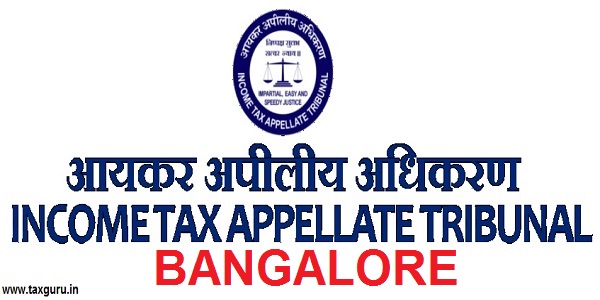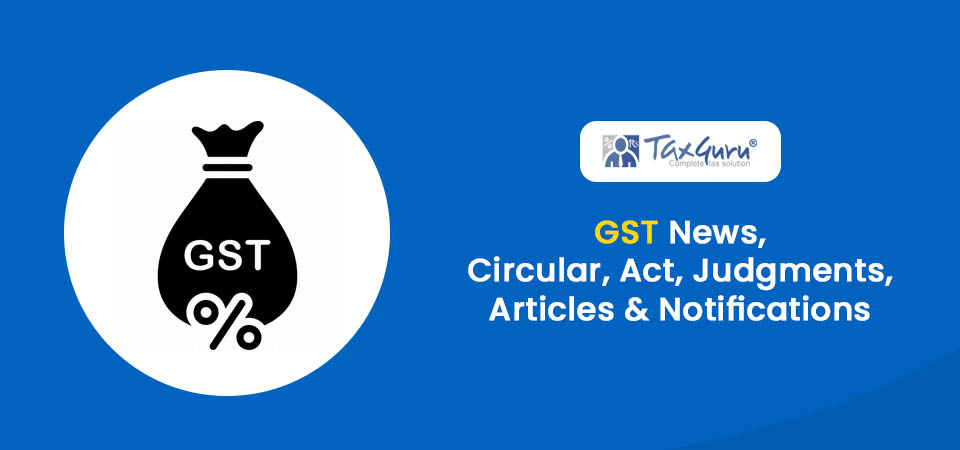Case Law Details
Gujarat Chemical Port Terminal Co. Ltd Vs DCIT (ITAT Ahmedabad)
Revenue’s appeal involve a common issue relating to the deletion by CIT(A) of addition made by Assessing Officer on account of prior period expenses while computing book profit under Section 115JB of the Act.
This issue is squarely covered in favour of the assessee inter alia by the decision of Hon’ble Karnataka High Court in the case of CIT v . GMR Industries Ltd., [2020] 425 ITR 504, wherein it was held that prior period expenses charged to profit and loss account cannot be deducted from the profit of the year for the purpose of computing book profit under Section 115JB of the Act as the same does not fall within the purview of Section 115JB of the Act. To the similar effect is the decision of Mumbai Bench of this Tribunal in the case of Shivshahi Punarvasan Prakalp Ltd. Vs. ITO, (2012) 135 ITD 51 (Mumbai), wherein it was held that there is no provision for any adjustment on account of prior period expenses in Explanation-1 to Section 115JB(2) of the Act and, therefore, any addition on account of disallowance of prior period expenses while computing book profit is not permitted. Respectfully following these judicial pronouncements, we uphold the impugned order of the learned CIT(A) deleting the addition of Rs.31,26,316/ made by the Assessing Officer on account of prior period expenses while computing the book profit of the assessee-company under Section 115JB of the Act. The appeal of the Revenue for AY 2014-15 is accordingly dismissed.
FULL TEXT OF THE ORDER OF ITAT AHMEDABAD
These four appeals, two filed by the assessee being ITA Nos.394/SRT/2018 and 2373/Ahd/2018 and two filed by the Revenue being ITA Nos. 1428 & 2234/Ahd/2018, are cross-appeals which are directed against two separate orders of learned Commissioner of Income-tax (Appeals)-1, Vadodara (“CIT(A)” in short) dated 08.03.2018 and 13.08.2018 for Assessment Years 2013-14 and 2014-15 respectively. Since the issues involved in these appeals are common, the same have been heard together and are being disposed of by a single consolidated order for the sake of convenience.
2. First, we shall take up the assessee’s appeal for Assessment Year 2013-14 being ITA No.394/SRT/2018 which is directed against the order of the learned CIT(A)-1, Vadodara dated 08.03.2018.
3. Ground Nos. 1 & 2 raised by the assessee in this appeal for AY 2013-14 involve a common issue relating to the addition of Rs.12,52,745/- made by the Assessing Officer and confirmed by the learned CIT(A) by restricting the claim of the assessee for depreciation on electrical fittings to 10% instead of 15%.
4. The assessee, in the present case, is a company which is engaged in the business of Port and Terminal Operations. The return of income for the year under consideration i.e. AY 2013-14 was filed by the assessee on 27.09.2013 declaring a total income at Rs. Nil, after setting off brought forward unabsorbed depreciation to the extent of Rs.35,93,21,210/-. Book profit under Section 115JB of the Income-tax Act, 1961 (“the Act” in short) was declared by the assessee in the said return at Nil after setting off unabsorbed business loss to the extent of Rs.16,50,63,161/-. The case of the assessee was selected for scrutiny and a notice under Section 143(2) of the Act was issued by the Assessing Officer to the assessee on 03.09.2014. During the course of assessment proceedings, it was noticed by the Assessing Officer that depreciation on electrical installation @ 15% was claimed by the assessee as against the rate of 10% specifically provided for electrical fittings. In this regard, it was explained by the assessee that the electrical installation being integral part of plant and machinery was eligible for depreciation @ 15% which is applicable to plant and machinery. This explanation of the assessee was not found tenable by the Assessing Officer and he restricted the claim of the assessee for depreciation on electrical installation at 10% instead of 15% claimed by the assessee which resulted in addition of Rs.12,52,745/-. On appeal, the learned CIT(A) confirmed the addition made by the Assessing Officer on this issue following the appellate order of his learned predecessor in assessee’s own case for AY 2012-13.
5. We have heard the arguments of both the sides and also perused the relevant material available on record. As agreed by the learned representatives of both the sides, this issue is squarely covered in favour of the assessee by the decision of Surat Bench of this Tribunal in assessee’s own case for AY 2012-13 rendered vide its order dated 13.12.2019 passed in ITA No. 1888/Ahd/2016 wherein the claim of the assessee for electrical installation @ 15% was allowed by the Tribunal. Since the issue involved in the year under consideration as well as all the material facts relevant thereto are similar to AY 2012-13, we respectfully follow the decision of the Co-ordinate Bench of this Tribunal in assessee’s own case for the immediately preceding year and direct the Assessing Officer to allow the claim of the assessee for depreciation on electrical installation @ 15%.
6. As regards the issue raised in Ground No.3 relating to the disallowance of Rs.1,31,882/- made by the Assessing Officer and confirmed by the learned CIT(A) on account of belated payment of employees’ contribution towards Provident Fund, the learned representatives of both the sides have agreed that this issue is squarely covered against the assessee by the decision of Hon’ble Gujarat High Court in the case of CIT Vs. Gujarat State Road Transport Corporation, (2014) 366 ITR 170 (Guj.). Respectfully following the said judgment of Hon’ble jurisdictional High Court, we uphold the impugned order of the learned CIT(A) confirming the disallowance made by the Assessing Officer on account of belated payment of employees’ contribution towards Provident Fund and dismiss Ground No.3 of assessee’s appeal for AY 2013-14.
7. The issue involved in Ground No.4 of the assessee’s appeal relates to the addition of Rs.15,14,241/- made by the Assessing Officer and confirmed by the learned CIT(A) on account of short receipts allegedly declared by the assessee as compared to the receipts reflected in 26AS.
8. Contractual receipts, rent and professional fees aggregating to Rs.15,14,241/- as reflected in 26AS were not disclosed by the assessee in the return of income. In this regard, the explanation offered by the assessee that the said amounts were received as advances and hence not to be treated as income for the year under consideration was not found acceptable either by the Assessing Officer or by the learned CIT(A) in the absence of documentary evidence furnished by the assessee to support and substantiate the same. Accordingly, addition of Rs.15,14,241/- was made by the Assessing Officer to the total income of the assessee which has been confirmed by the learned CIT(A).
9. We have heard the arguments of both the sides on this issue and also perused the relevant material available on record. The learned Counsel for the assessee has submitted that the assessee is now in a position to produce the relevant documentary evidence to establish that the amounts in question represented advances on which taxes were deducted by the concerned parties and the same did not constitute the income of the assessee chargeable to tax in the year under consideration. He has urged that one opportunity may be given to the assessee to do so by sending the matter back to the Assessing Officer. Since the learned DR has not raised any objection in this regard, we restore this issue to the file of the Assessing Officer for giving the assessee one more opportunity to establish on evidence that the amounts in question were received by it as advances and the same did not constitute its income chargeable to tax for the year under consideration. Ground No.3 is accordingly treated as allowed for statistical purposes.
10. Now we take up the Revenue’s appeal for AY 2013-14 being ITA No.1428/Ahd/2018. In the solitary ground raised in this appeal, the Revenue has challenged the action of the learned CIT(A) in allowing the claim of the assessee for reduction of business loss or unabsorbed business loss, whichever is lower, from the book profit computed under Section 115JB of the Act.
11. In the return of income filed for the year under consideration, unabsorbed business loss of Rs.16,50,63,161/- was claimed by the assessee and the same was set off against book profit computed under Section 115JB of the Act. The Assessing Officer, however, noted that the assessee-company had already set off all the losses against the capital reserve and did not have any brought forward losses as reflected in its balance-sheet. The Assessing Officer, therefore, disallowed the claim of the assessee for set off of brought forward business loss against book profit. On appeal, the learned CIT(A) allowed the claim of the assessee on this issue vide paragraph Nos. 8.2 and 8.2.1 of his impugned order which read as under:-
“8.2. I have carefully considered the facts on record and submissions of the Ld. AR. Undisputedly, the appellant company has gone into restructuring and in view of the provisions of Section 100 to 104 of Companies Act, 1956, the capital reduction arrangement was made. This capital reduction arrangement was duly approved by the Hon’ble Jurisdictional High Court vide order dated 08.10.2010. It is claimed that in the process of restructuring, due to capital reduction arrangement, the business losses and unabsorbed depreciation were adjusted against the share capital and reserves and surplus in order to bring a better net worth of the company. The Ld. AR has furnished details of unabsorbed business loss, and depreciation from AY 2002-03 to AY 2010-11 totaling to Rs.58,84,54,570/-. The Ld. AR has heavily submitted that even after restructuring of the business and reduction of capital after adjusting the brought forward business loss and unabsorbed depreciation, the same remained to be adjusted against book profit u/s 115JB. In this regard, he has relied upon the decision of the Hon’ble Jurisdictional ITAT in the case of Surat Textile Mills Ltd. vs DCIT (2016) 70 taxmann.com 158 (Ahd), which stands confirmed by the Hon’ble High Court vide order reported as 79 taxmann.com 209 (Guj), wherein, it is held as under:
“Section 115JB of the Income-tax Act, 1961 – Minimum alternate tax – Payment of tax (Unabsorbed depreciation) – Assessment year 2012-13 – Assessee-company was declared as sick industry – Consequently, as per rehabilitation scheme, all credit amounts of capital nature, like, equity share capital account, secured loan accounts etc. were transferred to credit of rehabilitation account and said credit was, then, used to adjust debit balance of profit and loss account – On assessee’s net worth became positive, assessee deducted unabsorbed deprecation from book profits to calculate minimum alternate tax – Assessing Officer disallowed said deduction – Whether restructuring credits brought into profit & loss account against accumulated debit balance while giving effect to rehabilitation scheme would not extinguish loss and depreciation from accounts of assessee in actual terms – Held, yes – Whether such loss would be available as per accounts prepared under Parts-II and III of Schedule-VI of Companies Act and, therefore, assessee will be entitled to claim reduction of loss/unabsorbed depreciation, whichever is lower, from book profit -Held, yes”
8.2.1. In view of the above decision of the Hon’ble Jurisdictional High Court which is binding on me, I hold that the debit balances of the P & L Account being business loss/unabsorbed depreciation adjusted against all the credit amounts of capital nature such as equity share capital/reserves & surplus etc. as a result of rehabilitation scheme or restructuring, would not extinguish in actual terms and hence, the same would be available for the purposes of accounts prepared as per Part-II and III of Schedule-VI of Companies Act. Accordingly, the appellant will be entitled to claim reduction of business loss or unabsorbed depreciation, whichever is lower from the book profit computed u/s 115JB. Therefore, the AO is directed to allow consequential relief after verifying the figure of unabsorbed brought forward business loss claimed by the appellant. Thus, appellant succeeds on this account.”
12. We have heard the arguments of both the sides and also perused the relevant material available on record. It is observed that this issue involved in the Revenue’s appeal is squarely covered in favour of the assessee by the decision of Hon’ble Gujarat High Court in the case of PCIT Vs. Surat Textile Mills Ltd, (2017) 79 taxmann.com 209, wherein it was held as under:-
“Section 115JB of the Income-tax Act, 1961 – Minimum alternate tax – Payment of tax (Unabsorbed depreciation) – Assessment year 2012-13 – Assessee-company was declared as sick industry – Consequently, as per rehabilitation scheme, all credit amounts of capital nature, like, equity share capital account, secured loan accounts etc. were transferred to credit of rehabilitation account and said credit was, then, used to adjust debit balance of profit and loss account – On assessee’s net worth became positive, assessee deducted unabsorbed deprecation from book profits to calculate minimum alternate tax – Assessing Officer disallowed said deduction – Whether restructuring credits brought into profit & loss account against accumulated debit balance while giving effect to rehabilitation scheme would not extinguish loss and depreciation from accounts of assessee in actual terms – Held, yes – Whether such loss would be available as per accounts prepared under Parts-II and III of Schedule-VI of Companies Act and, therefore, assessee will be entitled to claim reduction of loss/unabsorbed depreciation, whichever is lower, from book profit -Held, yes”
12.1 As the issue involved in the present case as well as all the material facts relevant thereto are similar to the case of Surat Textile Mills Ltd (supra) decided by the Hon’ble Gujarat High Court, we respectfully follow the judgment of the Hon’ble Gujarat High Court in the said case and uphold the impugned order of the learned CIT(A) giving relief to the assessee on this issue. The appeal of the Revenue for AY 2013-14 is accordingly dismissed.
13. Now we take up the assessee’s appeal for AY 2014-15 being ITA No.2373/Ahd/2018 which involves a solitary issue relating to the addition made by the Assessing Officer and confirmed by the learned CIT(A) by restricting depreciation on electrical installation @ 10% as against 15% claimed by the assessee which is similar to the one involved in Ground No.1 of the assessee’s appeal for AY 2013-14 which has already been decided by us in the preceding paragraph of this order. Following our conclusion drawn for AY 2013-14 on similar issue, we delete the addition made by the Assessing Officer and confirmed by the learned CIT(A) on this issue and allow this appeal of the assessee.
14. By way of Ground No.1 of its appeal for AY 2014-15 being ITA No.2234/Ahd/2018, the Revenue has challenged the action of the learned CIT(A) in allowing the claim of the assessee for reduction of business loss or unabsorbed business loss, whichever is lower, from the book profit computed under Section 115JB of the Act. It is observed that this issue is similar to the one involved in the solitary ground raised by the Revenue in its appeal for AY 2013-14 which has already been decided by us in the preceding paragraph of this order. Following our conclusion drawn for AY 2013-14 on similar issue, we uphold the impugned order of the learned CIT(A) giving relief to the assessee on this issue. Ground No.1 of Revenue’s appeal for AY 2014-15 is accordingly dismissed.
15. Ground Nos. 2 & 3 of the Revenue’s appeal for AY 2014-15 involve a common issue relating to the deletion by the learned CIT(A) of the addition of Rs.31,26,316/- made by the Assessing Officer on account of prior period expenses while computing book profit under Section 115JB of the Act.
16. We have heard the arguments of both the sides on this issue and also perused the relevant material available on record. As agreed by the learned representatives of both the sides, this issue is squarely covered in favour of the assessee inter alia by the decision of Hon’ble Karnataka High Court in the case of CIT v . GMR Industries Ltd., [2020] 425 ITR 504, wherein it was held that prior period expenses charged to profit and loss account cannot be deducted from the profit of the year for the purpose of computing book profit under Section 115JB of the Act as the same does not fall within the purview of Section 115JB of the Act. To the similar effect is the decision of Mumbai Bench of this Tribunal in the case of Shivshahi Punarvasan Prakalp Ltd. Vs. ITO, (2012) 135 ITD 51 (Mumbai), wherein it was held that there is no provision for any adjustment on account of prior period expenses in Explanation-1 to Section 115JB(2) of the Act and, therefore, any addition on account of disallowance of prior period expenses while computing book profit is not permitted. Respectfully following these judicial pronouncements, we uphold the impugned order of the learned CIT(A) deleting the addition of Rs.31,26,316/ made by the Assessing Officer on account of prior period expenses while computing the book profit of the assessee-company under Section 115JB of the Act. The appeal of the Revenue for AY 2014-15 is accordingly dismissed.
17. In the result, assessee’s appeal for AY 2013-14 is partly allowed and for AY 2014-15 is allowed while the Revenue’s appeals for AYs 2013-14 and 2014-15 are dismissed.
Order pronounced in the open Court on 5th August, 2022 at Ahmedabad.

























